 Freedom of Expression
Freedom of Expression
"Congress shall make no law prohibiting the freedom of expression." In this slideshow we will consider what this phrase means and what the Court has said it means.
Select an image to display a larger view and image caption. View each image as often as you would like and take notes.
-
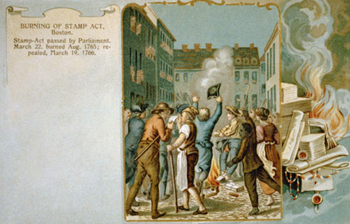
Free Expression
Democracy depends on the free communication of ideas, and the Constitution protects that expression in the First Amendment.
In the First Amendment are found the five basic freedoms of American citizens. The freedoms of speech and press are often called our freedom of expression. The freedom of assembly is analogous with our freedom to associate with whom we please, and the right to petition government is the right to demand change from government. All are essential to a free people.
The right to assemble was important to the founding fathers as a way to ensure that people have the right to demand change.
-
Freedom of Speech and Press
Freedom of expression, including speech and press, is the most fundamental element of a democracy. Democracies depend on the exchange of ideas, challenges to those in power, and the right of people to form associations and communicate ideas. These rights sometimes come in conflict with the police powers of the state to protect its citizens, and when they do, the Supreme Court must decide whether the speech is protected by the First Amendment or whether it is unprotected speech.
This famous photograph by Jacob Riis was published in his book How the Other Half Lives which exposed the slum conditions of the poor living in New York City at the turn-of-the-century. The freedom to publish work that is critical of the government or society is protected by the First Amendment.
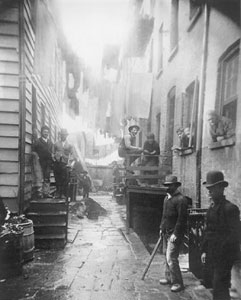
-
Protected Speech
Expression begins with ideas, which are communicated physically or symbolically. The Court has generally been protective of ideas, recognizing that unpopular ideas require the greatest protection. The Court is reluctant to engage in advance censorship (prior restraint) and some speech, especially political speech, requires the greatest protection. Some speech, however, is not protected, and the court has established guidelines to determine this.
In this picture Fay Hubbard, a 19-year old suffragette is selling suffragette pamphlets. Speech, such as her right to distribute these pamphlets urging American men to extend the right to vote to women, is protected by the First Amendment.
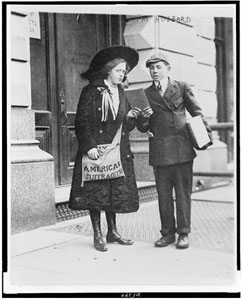
-
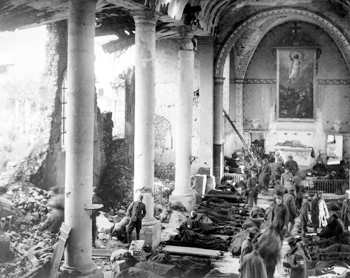
Clear and Present Danger
In 1917 Charles Schenck was convicted of conspiracy to violate the Espionage Act which was passed during World War I. Schenck was head of the local Socialist Party and was circulating leaflets critical of the war effort among men who had been accepted for the draft.
In ruling for the United States, the Court noted that free speech cannot conflict with a legitimate power of the government. "The most stringent protection of free speech would not protect a [person] in falsely shouting fire in a theater and causing a panic. . . The question in every case is whether the words used are used in such circumstances and are of such a nature as to create a clear and present danger that will bring about the substantive evils that Congress has a right to prevent." (Justice Oliver Wendell Holmes) In this case, the Court established the "Clear and Present Danger " test for a limitation on free speech.
-
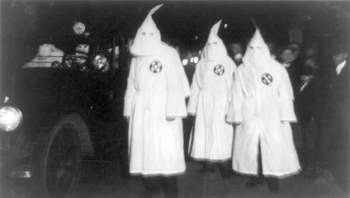
Brandenburg v. Ohio
Brandenburg, a member of the Ku Klux Klan, was convicted of violating Ohio's law making it illegal to advocate the necessity of crime or violence or to assemble with others to advocate such conduct.
In Brandenburg v. Ohio the Court clarified the clear and present danger rule. The Court said "Since the statute, by its words and as applied, purports to punish mere advocacy and to forbid, on pain of criminal punishment, assembly with others merely to advocate the described type of action, it falls within the condemnation of the First and Fourteenth Amendments. Freedoms of speech and press do not permit a State to forbid advocacy of the use of force or of law violation except where such advocacy is directed to inciting or producing imminent lawless action and is likely to incite or produce such action. "
The Criminal Syndicalism Act made illegal the advocacy and teaching of doctrines while ignoring whether or not that advocacy and teaching would actually incite imminent lawless action. Brandenburg's conviction was reversed.
-
United States v. O'Brien
These students are exercising their right to peaceful assembly and the right to petition the government by protesting the Vietnam War. In 1965, David Paul O'Brien was convicted of violating the Selective Service Act when he burned his draft card to protest the draft and the Vietnam war. The Supreme Court treats protests that might threaten national security differently than those that don't.
The Court upheld O'Brien's conviction, stating that the draft law was within the power of Congress, and that it furthered legitimate government interest.
Since the law was not designed to limit speech, but to further the draft, it was upheld.
"The many functions performed by Selective Service certificates establish beyond doubt that Congress has a legitimate and substantial interest in preventing their wanton and unrestrained destruction and assuring their continuing availability by punishing people who knowingly and willfully destroy or mutilate them.
A government regulation is sufficiently justified if it is within the constitutional power of the Government; if it furthers an important or substantial governmental interest; if the governmental interest is unrelated to the suppression of free expression; and if the incidental restriction on alleged First Amendment freedoms is no greater than is essential to the furtherance of that interest. We find that the 1965 Amendment to § 12 (b)(3) of the Universal Military Training and Service Act meets all of these requirements, and consequently that O'Brien can be constitutionally convicted for violating it."
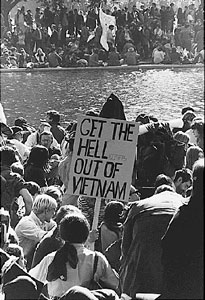
-
Unprotected Speech
Some speech is clearly not protected. Libel and slander are not protected, nor is obscenity.
In their attempt to draw the line separating permissible from impermissible speech, judges have had to balance freedom of expression against competing values like
 Public order
Public order
 National security
National security
 The right to a fair trial
The right to a fair trial
The Court has said that material with no serious social value which describes conduct in an offensive way, appealing to prurient interests, may be limited by applying contemporary community standards. These are difficult standards, but local community ordinances have been upheld, as have local zoning laws concerning obscenity. The Justice Department prosecutes cases of child pornography on the federal level as a criminal offense.
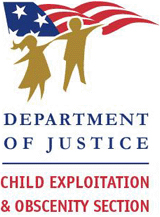
-
Peter Zenger
Libel, writing something false and damaging to a person, is not protected, nor is saying something defamatory, but these are difficult to prosecute as their intent is difficult to prove.
Federal Hall in New York City was the site of the trial for John Peter Zenger who was accused of libel for writing an article critical of the British government. A jury ruled that truth is a defense against libel and set a standard for libel that is still the standard in this country.
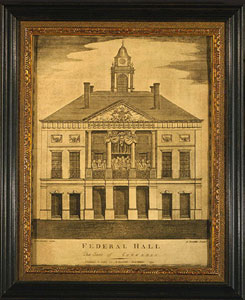
-
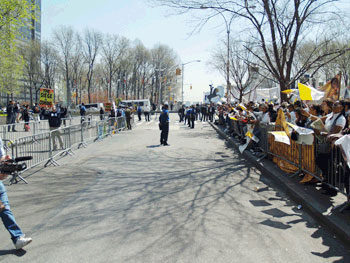
Government's Responsibility
The first amendment rights sometimes come in conflict with the other rights and obligations of government. The Court has ruled that steps taken to protect an unpopular speaker by controlling a crowd, to protect public safety, and to protect a defendant's right to a fair trial are required of government in order to protect our basic rights.
Protestors from Westboro Baptist Church hold many views unpopular with most Americans. They still have the right to express their views and, according to the Supreme Court, government has to protect their safety from the public and keep the peace.








